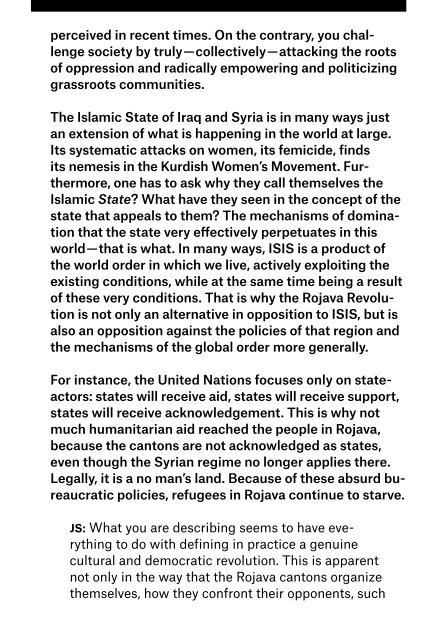Stateless Democracy
NWA5-Stateless-Democracy1.pdf?utm_content=buffer7beda&utm_medium=social&utm_source=twitter
NWA5-Stateless-Democracy1.pdf?utm_content=buffer7beda&utm_medium=social&utm_source=twitter
You also want an ePaper? Increase the reach of your titles
YUMPU automatically turns print PDFs into web optimized ePapers that Google loves.
perceived in recent times. On the contrary, you challenge<br />
society by truly — collectively — attacking the roots<br />
of oppression and radically empowering and politicizing<br />
grassroots communities.<br />
The Islamic State of Iraq and Syria is in many ways just<br />
an extension of what is happening in the world at large.<br />
Its systematic attacks on women, its femicide, finds<br />
its nemesis in the Kurdish Women’s Movement. Furthermore,<br />
one has to ask why they call themselves the<br />
Islamic State? What have they seen in the concept of the<br />
state that appeals to them? The mechanisms of domination<br />
that the state very effectively perpetuates in this<br />
world — that is what. In many ways, ISIS is a product of<br />
the world order in which we live, actively exploiting the<br />
existing conditions, while at the same time being a result<br />
of these very conditions. That is why the Rojava Revolution<br />
is not only an alternative in opposition to ISIS, but is<br />
also an opposition against the policies of that region and<br />
the mechanisms of the global order more generally.<br />
For instance, the United Nations focuses only on stateactors:<br />
states will receive aid, states will receive support,<br />
states will receive acknowledgement. This is why not<br />
much humanitarian aid reached the people in Rojava,<br />
because the cantons are not acknowledged as states,<br />
even though the Syrian regime no longer applies there.<br />
Legally, it is a no man’s land. Because of these absurd bureaucratic<br />
policies, refugees in Rojava continue to starve.<br />
JS: What you are describing seems to have everything<br />
to do with defining in practice a genuine<br />
cultural and democratic revolution. This is apparent<br />
not only in the way that the Rojava cantons organize<br />
themselves, how they confront their opponents, such<br />
as ISIS, a product of imperialist politics and radical,<br />
patriarchal, totalizing state policies — but more crucially<br />
— in how Rojava cantons operate in the face of<br />
a geopolitical order that is not able to think through<br />
the radical premises of democracy, of liberating<br />
democracy from the structure of the state.<br />
DD: The Rojava Revolution, in Kobanê for example, is very<br />
often reduced to a fight that is only about self-defense, as<br />
if it were only about toppling ISIS, which is indeed a major<br />
issue or else people would face genocide. But the system<br />
that is being implemented in Rojava, its structure and<br />
mentality — that is what really frustrates ISIS and the international<br />
order alike. In a sense, this is self-defense also in<br />
a philosophical way, of setting the terms of your existence.<br />
Turkey calls the PKK, PYD, and ISIS all terrorists. The<br />
word “terror” is a very sensitive one for the Kurds,<br />
because our communities have been criminalized as<br />
terrorists for so long. But it is clear that these two “terrorist<br />
systems” are not the same to Turkey, already because<br />
the PYD, for instance, did not receive funding or support<br />
or at least silent approval from Turkey, while ISIS did. At<br />
the same time, the international order has for two years<br />
remained willfully blind to the threat of ISIS despite repeated<br />
warnings from the Kurds.<br />
JS: At the end of the day, the geopolitical order<br />
seems more afraid of a democracy that is capable<br />
of organizing itself outside of the state — critiquing<br />
and undermining that very order — than the idea of<br />
so-called terrorism.<br />
DD: It is very interesting indeed to see how nobody wants<br />
to acknowledge the cantons, despite it now being very<br />
52–53


